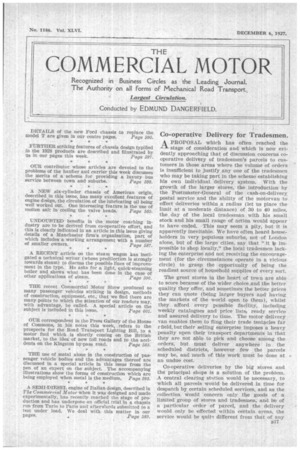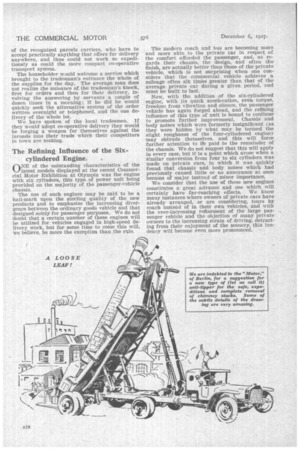Co-operative Delivery for Tradesmen.
Page 43

Page 44

If you've noticed an error in this article please click here to report it so we can fix it.
A PROPOSAL which has often reached the stage of consideration and which is now evidently approaching that of discussion concerns cooperative delivery of tradesmen's parcels to customers in those areas where the volume of orders is insufficient to justify any one of the tradesmen who may be taking part in the scheme establishing his own individual delivery system. With the growth of the larger stores, the introduction by the Postmaster-General of the cash-on-delivery postal service and the ability of the motorvan to effect deliveries within.a radius (let us place the limit at a moderate distance) of 30 to 40 miles, the day of the local tradesman with his small stock and his small range of action would appear•to have ended. This may seem a pity, but it is apparently inevitable. We have often heard householders in very populous suburbs, not of London alone, but of the large cities, say that "It impossible to shop locally," the local tradesmen lacking the enterprise and not receiving the encouragement (for the circumstances operate in a vicious circle) to grasp the opportunity of being the readiest source of household supplies of every sort.
The great stores in the heart of town are able to score because of the wider choice and the better quality they offer, and sometimes the better prices they can quote (being larger buyers and having the markets of the world open to them), whilst they afford every possible facility, including weekly catalogues and price lists, ready service and assured delivery to time, The motor delivery van enables them to fling their trade tentacles far ifield, but their selling enterprise imposes a heavy penalty upon their transport departments in that they are not able to pick and choose among the orders, but must deliver anywhere in the scheduled districts, however few the parcels may be, and much of this work must be done at an undue cost.
Co-operative deliveries by the big stores and the principal shops is a solution of the problem. A central clearing station would be necessary, to which all parcels would be delivered in time for despatch by certain scheduled services, and as the collection would concern only the goods of a limited' group of stores and tradesmen, and be of a particular order of parcel, and the delivery would only be effected within certain areas, the service would be quite different from that of any of the recognized parcels carriers, who have to accept practically anything that offers for delivery anywhere, and thus could not work so expeditiously as could the more compact co-operative transport system.
The householder would welcome a service which brought to the tradesman's entrance the whole of the supplies for the day. The average man does not realize the nuisance of the tradesman's knock, first for orders and then for their delivery, involving the answering by servants a couple of dozen times in a morning ; If he did he would quickly seek the alternative system of the order written overnight or telephoned, and the one delivery of the whole lot.
We have spoken of the local tradesmen. If they would adopt co-operative delivery they would be forging a weapon for themselves against the inroads into their trade which their competitors in town are making.




















































































































